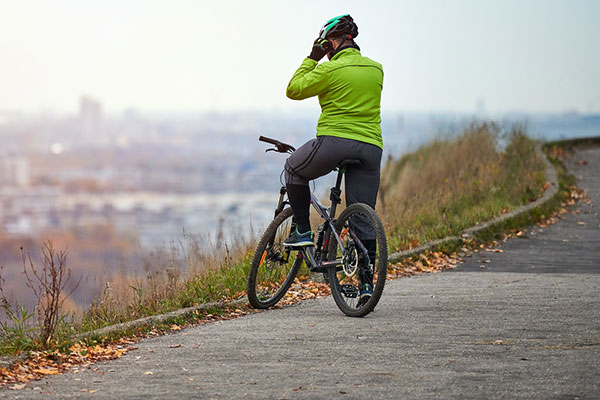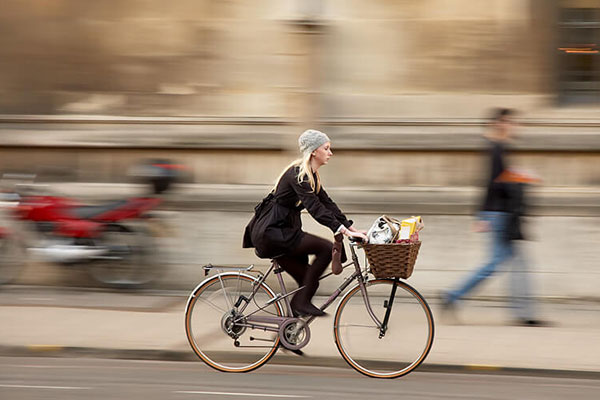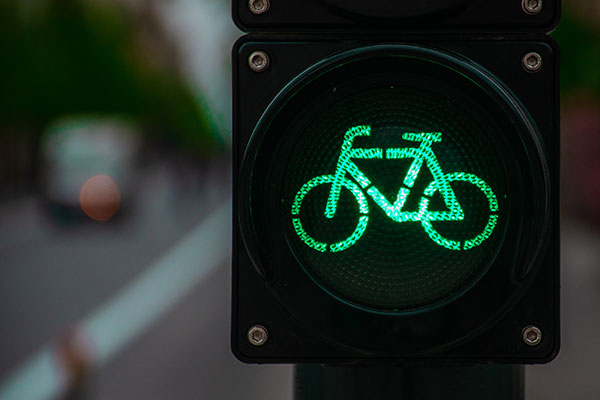Section 7 of the Finance (NO. 2) Bill 2008 proposes the introduction of a tax incentive aimed at encouraging more employees to cycle to and from work. The proposal is to exempt from income tax the benefit-in-kind arising from the provision of a bicycle/bicycle safety equipment by an employer to an employee or director, where the bicycle/associated safety equipment is used by the employee or director mainly for qualifying journeys.
Cycle to Work Scheme
Buy a new bike and accessories through your wages and save between 29.5% and 49.5% on the total price.
Governments Cycle to Work Scheme
There is a limit of €1,500 on the amount of expenditure an Employer can incur in respect of any one Employee or Director. Additionally, the exemption from income tax in respect of the benefit-in-kind can only be availed of once in any five-year period by an Employee or Director.
The exemption will apply to expenditure incurred by an employer on or after 1 January 2009.
There will be a limit of €1,250 for a normal bike and up to €1500 for an electric bike on the amount of expenditure an employer can incur in respect of any one employee or director. Additionally, the exemption from income tax in respect of the benefit-in-kind can only be availed of once in any five-year period by an employee or director.
The bicycle/safety equipment must be used by the employee or director mainly for qualifying journeys. This means the whole or part (e.g. between home and train station) of a journey between the employee’s or director’s home and normal place of work, or between his or her normal place of work and another place of work. While an employer will not be required to monitor the use of the bicycle/safety equipment, the employer will be required to obtain a signed statement from the employee or director that the bicycle is for his or her own use and will be used mainly for qualifying journeys.
The exemption will cover pedal bicycles and tricycles, and pedelecs (an electrically assisted bicycle which requires some effort on the part of the cyclist in order to effect propulsion). It will not cover motorbikes, scooters or mopeds.
The following safety equipment will be covered by the exemption:
The exemption will only apply where bicycles/safety equipment are made available by the employer generally to all of its directors and employees.
The employer must purchase the bicycle/safety equipment. The exemption will not apply where an employee or director purchases a bicycle/safety equipment and gets reimbursed by his or her employer.
Similar to the travel pass scheme, an employer and employee may enter into a salary sacrifice arrangement whereby the employee agrees to forego part of his or her salary to cover the costs associated with the purchase of the bicycle/safety equipment. In such circumstances, the employee will not be liable to tax or PRSI or levies on the salary forgone. Where salary sacrifice arrangements are used, they must be completed over a maximum of 12 months from the date of provision of the bicycle/safety equipment.
In the specific context of the provision of a bicycle/bicycle safety equipment, Revenue will be prepared to regard salary sacrifice arrangements which meet the following conditions as being effective for tax purposes:
WILL AN EMPLOYEE BE ABLE TO AVAIL OF THE EXEMPTION WHERE AN EMPLOYER SPENDS IN EXCESS OF €1,500?
Yes, but only the first €1,250 in the case of a normal bike and €1500 in the case of an electric bike will be exempt from the benefit-in-kind charge to income tax.
WHERE AN EMPLOYER INCURS AN EXPENSE OF LESS THAN THE LIMITS ALLOWED IN YEAR ONE IN THE PROVISION OF A BICYCLE AND/OR ASSOCIATED SAFETY EQUIPMENT, WILL THE EMPLOYEE BE ABLE TO CLAIM EXEMPTION FROM THE BENEFIT-IN-KIND CHARGE IN RESPECT OF THE DIFFERENCE BETWEEN THE MAXIMUN ALLOWED AND THE AMOUNT SPENT BY THE EMPLOYER, WITHIN THE 4- YEAR PERIOD?
No. An employee can only avail of the exemption once in every 4 years. It does not matter that he or she may have been exempted from a benefitin-kind charge for an amount less than €1,250 in the case of a normal bike and €1500 in the case of an electric bike. The exemption is available once in every 4 year period.
WILL THE EXEMPTION APPLY TO EXPENDITURE INCURRED BY AN EMPLOYER IN THE PURCHASE OF BICYCLE PARTS RATHER THAN A WHOLE BICYCLE?
No. The exemption only applies to expenditure incurred in the purchase of a whole bicycle or associated safety equipment.
WILL THE EXEMPTION APPLY WHERE THE EMPLOYER DOES NOT PROVIDE BICYCLES BUT INCURS EXPENDITURE ON THE PURCHASE OF BICYCLE SAFETY EQUIPMENT?
Yes. The rules regarding the €1,250 & €1,500 limits on expenditure and the availability of the exemption once in every 4-year period will apply in the case of bicycle safety equipment, as it will in the case of bicycles.
CAN AN EMPLOYEE BUY THE BICYCLE/SAFETY EQUIPMENT AND GET A REFUND FROM HIS OR HER EMPLOYER?
No. The employer must purchase the bicycle/safety equipment.
CAN A BICYCLE BE BOUGHT ANYWHERE, E.G. ONLINE FROM ABROAD, OR WILL IT HAVE TO BE BOUGHT IN IRELAND OR FROM A PRE-APPROVED SELECTION OF SHOPS?
There are no limits as to where the bicycle should be purchased by the employer.
CAN EMPLOYEES CHOOSE THE BICYCLE/SAFETY EQUIPMENT THEMSELVES?
It is for employers to decide how they will operate the scheme. Some employers may allow employees to select the bicycle/safety equipment from the retailer of their choice and the employer may then put in place appropriate invoicing and delivery arrangements with the retailer. However, other employers may offer more limited options to employees. An employer could, for example, allow an employee to choose only from the range available from a single retailer.
WILL THERE BE ANY MINIMUM THRESHOLD ON THE AMOUNT OF DAYS A BICYCLE MUST BE USED?
There will be no threshold on the amount of days a bicycle should be used. However, the bicycle must be used mainly for qualifying journeys (i.e. travelling to and from work or between work places).
HOW WILL THE EXEMPTION OPERATE? DOES AN EMPLOYER HAVE TO NOTIFY REVENUE THAT THEY ARE PROVIDING BICYCLES/SAFETY EQUIPMENT FOR DIRECTORS AND EMPLOYEES? WHAT KIND OF DOCUMENTATION IS REQUIRED?
There will be no notification process involved but the purchase of bicycles and associated safety equipment by employers for directors and employees will be subject to the normal Revenue audit procedure with the normal obligations on employers to maintain records (e.g. delivery dockets, invoices, payments details, salary sacrifice agreements between employer and employee, signed statements from employees that the bicycle/bicycle safety equipment is for own use and will be used for travelling to and from work).
IS AN EMPLOYER LIABLE TO PAY VAT ON BICYCLES/SAFETY EQUIPMENT PURCHASED FOR EMPLOYEES AND DIRECTORS? CAN AN EMPLOYER CLAIM AN INPUT CREDIT IN RESPECT OF THE VAT?
Yes, VAT is payable. The employer will not be able to claim an input credit in respect of the VAT payable as the bicycles will not be used for the purposes of taxable supplies.
IF THE EMPLOYER INCURS DELIVERY CHARGES IN RESPECT OF THE BICYCLES/SAFETY EQUIPMENT, WILL THESE BE COVERED BY THE EXEMPTION?
Yes, provided the maximum value of the benefit, including delivery charges, does not exceed €1,250 for a normal bike and €1500 for an electric bike. The exemption is limited to the first €1,250 for a normal bike and €1,500 for an electric bike – where the cost exceeds this amount, a benefit-in-kind income tax charge will apply to the balance.
QUERIES ON THE EXEMPTION FROM BENEFIT-IN-KIND CHARGE IN RESPECT OF BICYCLES/SAFETY EQUIPMENT PROVIDED TO EMPLOYEES AND DIRECTORS.
Please contact:
Employer Information and Customer Service Unit
Telephone: 1890 25 45 65
If calling from outside the Republic of Ireland please phone
+ 353 67 63400
E-mail: employerhelp@revenue.ie
Please contact your local Revenue office.



